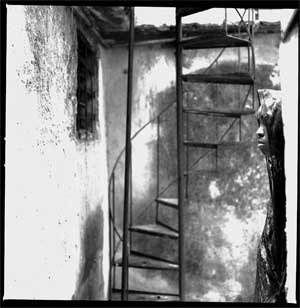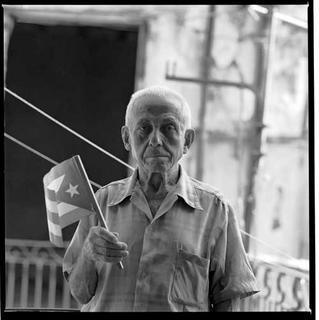I have had the good fortune to travel to Cuba six times in the past six years. Over that time I have come to know both the country and many of its people very well. One of the first things to strike me was that so much of what I had been told was simply not the case. I wanted to go to church while I was there because I had heard so much about the suppression of religions and the Bible. I called the National Office of the Episcopal Church in New York. I was given two names and numbers in Havana. I called Bishop Hernandez, the recently retired Bishop. He answered the phone and we made arrangements to get together while I was in Havana. On Sunday during our visit my wife and I attended Episcopal services in a nice church with approximately three hundred Cuban people. We were introduced to the congregation, took Holy Eucharist with them, and heard a good sermon. There was no suppression of anything by anyone. There were no soldiers or police and people walked in and out very publicly.
I have visited the Cardiovascular Institute in Havana. It is very similar in architecture and “décor” to a VA Hospital in the US-not fancy, but clean and functional. I observed cardiac catheterizations and angioplasty procedures for the entire day. The physicians were well trained, skilled, and kind to their patients. Each time the doctor made sure to speak to the entire family of the patient. No one was rushed, but a great deal of work got done. The supplies and materials were consistently re-used, not disposed of as in our country. I have also visited clinics where family doctors work. Again they are educated, skilled, and compassionate. Their major problem is a dire shortage of materials and medicines for their patients. Much of that was and is still “embargoed”.
In 2000 one could buy 30 Cuban pesos on the street (“black market”) for one US dollar. Two weeks ago the street exchange was 24 pesos for a US dollar. This change in the street rate suggests that the value of some of the cheapest currency in the world is increasing relative to one of the strongest. This change is a clear practical indication that the restrictions on doing business or spending dollars with Cuba are not working. We are not “strangling” the flow of dollars to the Cuban government. Their economy is this year the strongest it has been since 1989. In 2004 there were 1.7 million tourists from Europe, Canada, and Latin America who visited Cuba. It is projected to be 2.5 million visitors this year. The shift to a real Cuban currency pegged to the Euro is underway and appears to have been a very smart and successful change.
Cuba is not isolated from the world. It is not some gray Communist stronghold as is painted by the propagandists in the US. Poverty abounds there for sure-but it is not the abject poverty one sees in Haiti, Nicaragua, or Guatemala. Everyone gets an education (there is a 96% literacy rate), there is universal health care (every village has a clinic), there are no homeless (there is subsidized housing for all), and all children get extra rations to eat. Two weeks ago I noted that in Havana the stores have more merchandise than one year ago. People are happier, and they are optimistic.
The US has been interfering with Cuba since well before the Spanish-American War, which we entered to protect our agricultural and banking interests in that country. We have been consistently on the side of big business and fascist government in our history with Cuba. Cuba did not officially become “Communist” until after the Bay of Pigs debacle. We are still interfering. We are still subject to much disinformation, propaganda, and hype. There is no terrorist threat from Cuba. People in Cuba are far to concerned with getting three meals a day on the table for their children to be concerned about the politics of the government. We have no chance of fomenting another revolution there. If Castro dies or is incapacitated and we have not achieved some rapprochement with the Cuban people there will almost surely be anarchy. If fanatics from Florida return and try to reclaim their property there will be violence. Once again our country will have the blood of innocents on its hands because of poor planning.
On Wednesday, April 27, more than 800 people met in Washington, DC, to demonstrate their commitment to the lifting of the restrictions on travel and trade with Cuba. Richard Sparks, the Commissioner of Agriculture in Alabama wrote for the Birmingham Sun that last year $75 million worth of goods were sold to Cuba. That process generated additional income of more than $300 million to the state’s economy. Last year North Carolina did less than $3 million with Cuba. This is a market for small farmers and minority farmers just sitting there with dollars in hand waiting to be tapped into. Rather than disdaining Cuba, we should be jumping to get into business with them. There are bills introduced in both houses of the Congress, with identical wording, to lift the travel ban and re institute trade with Cuba. There is strong bipartisan support for both of these bills. Unfortunately I spoke with one legislative aid who gave me the standard patter about hundreds of dissidents being rounded up and jailed, the wrongness of sending dollars to the government, and told me that they had lived in Eastern Europe in the 1980s and knew what life in a communist country was like. Most of this is just not the case. I hasten to point out that Cuba is not the only country with a habit of imprisoning political prisoners in that country.
How about human rights? Well, can you say China? How better to get to know a country and to influence it than have our people there in the streets as tourists or business people spreading American ideals? The demise of the Soviet block and the opening up of Eastern Europe did not occur because we embargoed trade. President Reagan in fact did just the opposite. He encouraged travel to those areas. The recognition of China and the development of relations with the largest country on earth hardly resulted from not trading with the Chinese. Check your labels, ten to one says you are wearing something manufactured in China.
It is time for the other 99.99 % of Americans to speak up regarding Cuba. We are allowing our Cuba policy to be determined by crass politics, not diplomacy or sound economics. We are not helping human rights; we are actually harming people with these policies. We are in thrall to a small and ever diminishing group of radical right fanatics in Florida and New Jersey who were in fact harmed more than 40 years ago. It is time to get over it. It’s just common sense.


